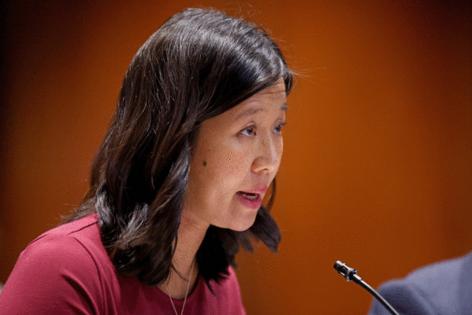Plan to shift Boston's tax burden toward businesses to go before State Senate
Published in News & Features
BOSTON — The State Senate is set to take up a proposal by Boston Mayor Michelle Wu to change the way property taxes are calculated in the hope of heading off a dramatic increase in residential rates.
A compromise “residential tax relief” plan worked out between Wu, the Greater Boston Chamber of Commerce, the Massachusetts Taxpayers Foundation, and other business interests in late October is expected to come up when the Senate meets Monday.
The tax plan cleared the House last week, despite attempts by Republicans to stall the process. The compromised proposal has been met with concern by fiscal watchdogs but found support among groups representing residents who face a potential 28% increase in their quarterly property tax bills if the change is not passed by the Legislature and accepted by the governor.
“Many senior homeowners will be unable to afford the impending tax spike in Boston without sacrificing other needs such as money for heat and food,” Carolyn Villers, the executive director of Massachusetts Senior Action Council, told the Herald.
For the Bostonian’s her group represents, Villers said, “Mayor Wu’s home rule represents hope for them to be able to stay in their homes and communities,” and lawmakers should stop dragging their feet.
“The delays have added to stress and they are urging the Senate to act quickly, favorably,” she said, noting members of the group will be present when the upper chamber convenes Monday morning.
Time is of the essence. Not only does the 193rd General Court end with the New Year, the city must send out tax bills for the third quarter of fiscal 2025 by the end of January, according to the mayor’s office.
The attempt to change the tax code comes in response to plummeting commercial real estate values in Boston as a result of the COVID-19 pandemic and subsequent shift away from the office for many workers. Cratering real estate values, when coupled with the way taxes are currently calculated in Boston, will cause much of the city’s financial burden to shift to its residents.
As things currently stand, the city is allowed to tax commercial property at 175% the rate of residential property. The plan passed by the House and up for consideration in the Senate would raise that level to 181.5% during fiscal 2025, 180% in fiscal 2026, and then 178% in fiscal 2027, before reverting back to the 175% limit. Those numbers are a compromise from Wu’s original plan to tax commercial property up to 200% the rate of residential property while decreasing the shift over the next five years.
According to Villers’ group, without intervention commercial tax burdens will fall to their lowest level in 20 years while residents are struggling to make ends meet.
The Mayor’s office described the plan as a “modest modification to the current tax system with clear guardrails to prevent too great of a burden from being placed on commercial taxpayers. This proposal is revenue-neutral and time-limited, stepping down over three years back to the current classification system.”
Some business leaders have gotten on board with the shift.
“The compromise reflected in this agreement enables the city to move forward with its fiscal year 2025 process and for us all to now refocus our collective efforts on implementing a long-term strategy for a thriving post-pandemic downtown,” Massachusetts Taxpayers Foundation President Doug Howgate said with the plan’s announcement.
Greater Boston Chamber of Commerce President and CEO Jim Rooney said that he’s “proud that we worked with Mayor Wu to reach a resolution that mitigates short-term property tax increases for residents while avoiding significant new burdens on commercial properties.”
But not everyone is on board.
Paul Craney, speaking for the Massachusetts Fiscal Alliance, says that Wu’s plan is just a cover for her proposal to raise the city’s budget by 8%. (That dramatic increase, according to the Boston Municipal Research Bureau, is due to “increased spending on Boston Public Schools, debt service, pension payments, and the creation of a new Planning Department.”)
“At a time when Boston businesses are still recovering from the economic challenges of the past few years, this bill sends the wrong message. It says that City Hall sees businesses not as partners in prosperity but as an ATM to fund new spending. Allowing Boston to bypass traditional taxpayer protections will inevitably embolden other cities and towns to follow suit,” Craney said.
Businesses in the downtown area are already struggling to keep their doors open with a reduced customer base, making them pay more to keep their investments in Boston isn’t a recipe for making the city an attractive place to do business, Craney said.
“This is a slippery slope toward unchecked local taxation and an even less competitive Massachusetts economy,” Craney said.
The plan should have been blocked last week by State House Republican leaders, who “had the power to stop this tax hike bill but declined to act,” Craney said.
“It’s now up to the Senate to restore some semblance of sanity to our state’s lack of spending restraint. Boston’s economic future depends on it,” he said.
In addition, another grassroots group emerged over the weekend to oppose the legislation.
In an open letter to members of the Senate, the group took aim at recent initiatives by the Mayor’s office, including a $110 million housing accelerator fund aimed at jumpstarting housing production. That initiative, which relies on unspent funds from prior city budgets, will be filed before the City Council this week.
“Please ask Mayor Wu to cut Boston’s budget,” the group said in its letter to Spilka and members of the Senate.
--------
©2024 MediaNews Group, Inc. Visit at bostonherald.com. Distributed by Tribune Content Agency, LLC.







Comments